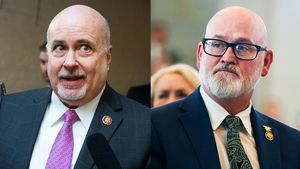Treatment GuideJust DiagnosedSex & DatingAfrican AmericanStigmaAsk the HIV DocPrEP En EspañolNewsVoicesPrint IssueVideoOut 100
CONTACTCAREER OPPORTUNITIESADVERTISE WITH USPRIVACY POLICYPRIVACY PREFERENCESTERMS OF USELEGAL NOTICE
© 2025 Pride Publishing Inc.
All Rights reserved
All Rights reserved
Scroll To Top
By continuing to use our site, you agree to our Privacy Policy and Terms of Use.
When the economy is fragile and money is tight, people with HIV and other infections may look to the Internet or retail stores for treatment options that are less expensive than doctor-prescribed meds. But the Food and Drug Administration is warning consumers not to trust drugs that were never evaluated or approved by the government, specifically those claiming to cure HIV, genital warts, herpes, and other incurable infections. Eleven manufacturers were issued letters on April 28 by the FDA and the Federal Trade Commission to stop making unproven claims with regards to their products. Among those manufacturers were Masterpeace Inc., which sells Disintegrate Formula and Detox Formula, claiming that its products treat HIV. Makers of other drugs like Medavir, Herpaflor, Viruxo, C-Cure, and Never An Outbreak claim to treat or cure herpes, though their claims have not been verified by the FDA. The companies were given 15 days to notify the agencies of their plans to take the necessary steps to come into compliance with the laws. If they fail to communicate these steps, they may face legal action including seizure injunction or criminal prosecution. FDA public relations specialist Shelly Burgess said the government agencies would continue to monitor and investigate the trade of these drugs, as well as build regulatory provisions to stop the dissemination of unapproved products. 'It is expected that the announcement will send a strong message that profiting through health fraud and endangering public health will not be tolerated,' Burgess said. It is unknown exactly how many people have purchased these products, but Brandon Macsata, CEO of the AIDS Drug Assistance Program (ADAP) Advocacy Association, says that this situation presents a clear example of why more could be done to regulate drug sales in the country. 'We could say that the United States has the most strict regulations for prescription drugs, and there's a reason. We want to make sure people are getting the medication they're supposed to be getting. We want to make sure it's a legitimate product that will combat the disease, or infection, that they have,' he said. Burgess suggests that people seeking treatment should see a medical professional who can prescribe regulated, FDA-approved treatment. Macsata says he understands the economic hardships that many currently grapple with, which may keep people from paying for prescription medication and legitimate health care. 'We're facing the ADAP crisis, where there's 8,000 people on waiting list to get medications, while government officials are parading around saying they're getting help from pharmaceutical programs,' he says. 'Still, we don't know how many people are falling through the cracks. You have to look at it from the patient's perspective. If you don't have insurance, and the one program you rely on says it can't afford to serve you, you're going to do what you can to get access to some medication.' Still, Mascata suggests finding other programs, charities, and other methods of finding sanctioned drugs. 'My advice to any patient is if it sounds too good to be true, it probably is,' he says. 'If you're looking for a drug that costs $35 a day, and you find it for $8, there's probably a reason.'
From our Sponsors
Most Popular
Lexi Love comes out as HIV+ after Trump deletes federal resources
January 23 2025 11:23 AM
Grindr is reminding us why jockstraps are so sexy and iconic
May 02 2025 5:36 PM
BREAKING NEWS: Trump admin moves to end federal HIV prevention programs
March 18 2025 6:10 PM
Trump's orders prompt CDC to erase HIV resources
January 31 2025 5:29 PM
Celebrating Black History Month with our annual African American issue
February 01 2025 3:28 PM
Tyler TerMeer vows to continue to fight for health care for all
January 28 2025 3:00 PM
Discover the power of Wellness in your life
March 26 2025 12:41 PM
Plus: Featured Video
Latest Stories
Dancer. Healer. Survivor. DéShaun Armbrister is all of the above
July 02 2025 8:23 PM
Two right-wing Supreme Court justices signal they may uphold access to PrEP and more
April 21 2025 4:10 PM
Broadway's best raise over $1 million for LGBTQ+ and HIV causes
April 03 2025 7:15 PM
Plus nominated for 2025 GLAAD Media Award
January 22 2025 12:42 PM
'RuPaul's Drag Race' star Trinity K Bonet quietly comes out trans
December 15 2024 6:27 PM
AIDS Memorial Quilt displayed at White House for the first time
December 02 2024 1:21 PM
BREAKING: Supreme Court rules to save free access to preventive care, including PrEP
June 27 2025 10:32 AM
1985: the year the AIDS crisis finally broke through the silence
June 26 2025 11:24 AM
Trump admin guts $258 million in funding for HIV vaccine research
June 03 2025 3:47 PM
500,000 Children at Risk: PEPFAR Funding Crisis
April 08 2025 3:51 PM
The Talk Season 5 premieres this spring with HIV guidance for the newly diagnosed
March 26 2025 1:00 PM
Jess King is here to help you live your happiest, healthiest life yet
March 24 2025 4:35 PM
A camp for HIV-positive kids is for sale. Here's why its founder is celebrating
January 02 2025 12:21 PM
VIDEO: A man living with HIV discusses his journey to fatherhood
June 10 2025 4:58 PM
HRC holds 'die-in' to protest Trump health care cuts
April 28 2025 2:11 PM
Season 4 of The Switch on resilience & radical self-love returns this spring
March 26 2025 12:20 PM
Gerald Garth is keeping people of color happy and healthy through trying times
March 11 2025 3:38 PM
This long-term HIV survivor says testosterone therapy helped save his life.
December 16 2024 8:00 PM
Ricky Martin delivers showstopping performance for 2024 World AIDS Day
December 05 2024 12:08 PM













































































